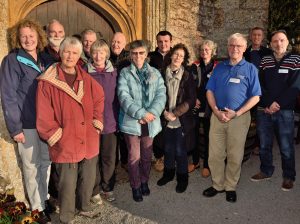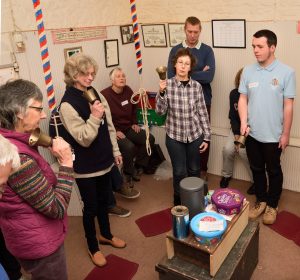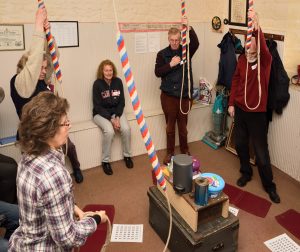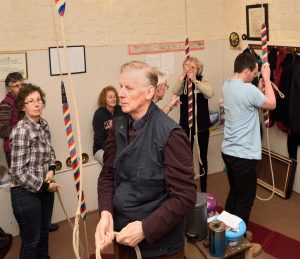Despite being located in the Somerset hinterland all 12 attendees (teachers, mentors and the  one observer) all managed to arrive before the appointed start time at Holy Cross church, to be welcomed with hot beverages and home made pastries, a very fine welcome particularly for those of us who had been travelling up to 2 hours to reach the venue. The home made cakes were a popular feature of the morning and afternoon refreshment breaks.
one observer) all managed to arrive before the appointed start time at Holy Cross church, to be welcomed with hot beverages and home made pastries, a very fine welcome particularly for those of us who had been travelling up to 2 hours to reach the venue. The home made cakes were a popular feature of the morning and afternoon refreshment breaks.
For those not familiar with this new course it is aimed at teachers who would like to concentrate on improving their teaching from the Rounds to the Plain Hunt stages and the full day’s agenda covered aspects based around the Levels 2 and 3 of the Learning the Ropes scheme. The day was made up of 4 sessions each concentrating on the theory and practical aspects of progressing in a logical, incremental way starting with a firm foundation of the necessary skills (bell control, listening, ropesight, rhythm and theory) and how they can be developed using call changes, Kaleidoscope ringing and covering before tackling Plain Hunt proper.
Other aspects included the importance of building a band with team building, motivating and enthusing, using goals and avoiding burn-out as well as developing coaching skills in ringing with good motivation and communications.
For the practical activities Les divided us up into two teams of 6 and took it in turns to try some of the practical techniques we could give our learners. One lesson learnt from these exercises is to ensure the helpers are very familiar with the exercises before the learner participates. These exercises included ringing
‘Twinkle, Twinkle Little Star’, alternate hand- and backstrokes in rounds, ringing handbells (one each), ringing Rounds facing outwards, ‘Putting the Fire Out’ (a Whiting Society speciality), calling call changes using numbers and places and ringing Bastow Little Bob Doubles. Les had also asked some of the attendees to give a short presentation to the rest of us on a particular and relevant subject.
Les also made us aware of the different forms of resources available to teachers and learners not only from ART but organisations such as the Whiting Society and Central Council. We
were also warned about the jargon that we use and how it can be ambiguous as well as confusing to the learner if not explained properly. Learners should also be encouraged to continue learning in the ringing chamber (when sitting out) and at home, and that worksheets can be a valuable tool in these circumstances as well as other resources. Some had extra practice in the pub at lunchtime playing Ringing Dominoes!
Many thanks to Jill Hansford and Les for running the course and to the catering corps for providing the refreshments during the day.
Summary of feedback about sessions (10 responses):-
The importance of foundation skills Exc 8 Good 2 Average – Poor 0
Building a band Exc. 7 Good 2 Average 1 Poor 0
Coaching ringing Exc. 7 Good 2 Average 1 Poor 0
Length of sessions Too short 1 About right 8 Too long 1
Practical sessions Exc 7 Good 3 Average 0 Poor 0
Teaching call changes Exc 6 Good 3 Average 1 Poor 0
Exploring Kaleidoscope ringing Exc 6 Good 4 Average 0 Poor 0
Introduction to covering and Plain Hun Exc 4 Good 6 Average 0 Poor 0
Overall satisfaction (10 Excellent, 1 Poor) 10 – 3, 9 – 3, 8 – 3, 7 – 1
Comments/suggestions:
Very informative
All been very helpful
Too much preaching to converted?!!




